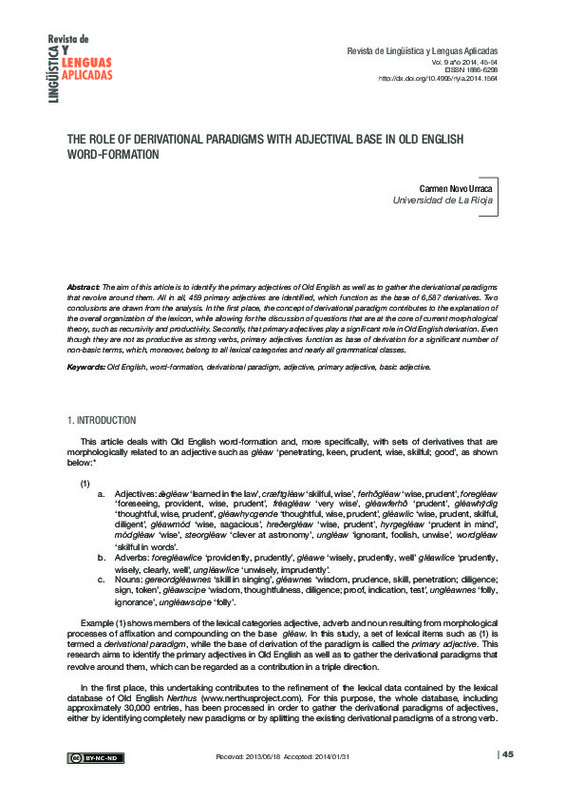JavaScript is disabled for your browser. Some features of this site may not work without it.
Buscar en RiuNet
Listar
Mi cuenta
Estadísticas
Ayuda RiuNet
Admin. UPV
The Role of Derivational Paradigms with Adjectival Base in Old English Word-Formation
Mostrar el registro sencillo del ítem
Ficheros en el ítem
| dc.contributor.author | Novo Urraca, Carmen
|
es_ES |
| dc.date.accessioned | 2014-11-26T10:12:27Z | |
| dc.date.available | 2014-11-26T10:12:27Z | |
| dc.date.issued | 2014-07-01 | |
| dc.identifier.issn | 1886-2438 | |
| dc.identifier.uri | http://hdl.handle.net/10251/44860 | |
| dc.description.abstract | [EN] The aim of this article is to identify the primary adjectives of Old English as well as to gather the derivational paradigms that revolve around them. All in all, 459 primary adjectives are identified, which function as base of 6,587 derivatives. Two conclusions are drawn from the analysis. In the first place, the concept of derivational paradigm contributes to the explanation of the overall organization of the lexicon, while allowing for the discussion of questions that are at the core of current morphological theory, such as recursivity and productivity. The conclusion is drawn that primary adjectives play a significant role in Old English derivation. Even though they are not as productive as strong verbs, primary adjectives function as base of derivation of a significant number of non-basic terms, which, moreover, belong to all lexical categories and nearly all grammatical classes. | es_ES |
| dc.description.sponsorship | This research has been funded through the project FFI2011 29532. The following abbreviations are used throughout the article: ADJ (adjective), ADV (adverb), BT (Bosworth Toller), f. (feminine), m. (masculine), n. (neuter), N (noun) and p. (plural). | |
| dc.language | Inglés | es_ES |
| dc.publisher | Editorial Universitat Politècnica de València | |
| dc.relation.ispartof | Revista de Lingüística y Lenguas Aplicadas | |
| dc.rights | Reserva de todos los derechos | es_ES |
| dc.subject | Old English | es_ES |
| dc.subject | Word-formation | es_ES |
| dc.subject | Derivational paradigm | es_ES |
| dc.subject | Adjective | es_ES |
| dc.subject | Primary adjective | es_ES |
| dc.subject | Basic adjective | es_ES |
| dc.title | The Role of Derivational Paradigms with Adjectival Base in Old English Word-Formation | es_ES |
| dc.type | Artículo | es_ES |
| dc.date.updated | 2014-11-26T08:33:18Z | |
| dc.identifier.doi | 10.4995/rlyla.2014.1564 | |
| dc.relation.projectID | info:eu-repo/grantAgreement/MICINN//FFI2011-29532/ES/POLOS SEMANTICOS EN EL LEXICO DEL INGLES ANTIGUO. CONSTRUCCION DEL SIGNIFICADO, PRIMITIVOS SEMANTICOS Y FORMACION DE PALABRAS/ | es_ES |
| dc.rights.accessRights | Abierto | es_ES |
| dc.description.bibliographicCitation | Novo Urraca, C. (2014). The Role of Derivational Paradigms with Adjectival Base in Old English Word-Formation. Revista de Lingüística y Lenguas Aplicadas. 9:45-54. https://doi.org/10.4995/rlyla.2014.1564 | es_ES |
| dc.description.accrualMethod | SWORD | es_ES |
| dc.relation.publisherversion | https://doi.org/10.4995/rlyla.2014.1564 | es_ES |
| dc.description.upvformatpinicio | 45 | es_ES |
| dc.description.upvformatpfin | 54 | es_ES |
| dc.type.version | info:eu-repo/semantics/publishedVersion | es_ES |
| dc.description.volume | 9 | |
| dc.identifier.eissn | 1886-6298 | |
| dc.contributor.funder | Ministerio de Ciencia e Innovación | |
| dc.description.references | Bammesberger, A. (1965). Deverbative jan-Verba des Altenglischen, vergleichend mit den übrigen altgermanischen Sprachen dargestellt. München: Ludwig-Maximilians U. | es_ES |
| dc.description.references | Caballero González, Laura, Elisa González Torres, Ana Ibá-ez Moreno and Javier Martín Arista 2004-2005: 'Predicados verbales primitivos y derivados en inglés antiguo. Implicaciones para la elaboración de una base de datos léxica'. Revista Espa-ola de Lingüística Aplicada 17-18: 35-49. | es_ES |
| dc.description.references | Campbell, A. (1987 [1959]): Old English Grammar. Oxford: Oxford UP. | es_ES |
| dc.description.references | de la Cruz Cabanillas, I. (2007). 'Semantic primes in Old English: a preliminary study of descriptors'. SELIM 14: 37-58 | es_ES |
| dc.description.references | Guarddon Anelo, M. C. (2009a). "The Natural Semantic Metalanguage of Old English Compound Adpositions", ES-English Studies 30, 61-83. | es_ES |
| dc.description.references | Guarddon Anelo, M. C. (2009a). "Un análisis de las propiedades combinatorias de los primitivos semánticos a través de las adposiciones complejas en inglés antiguo", Revista Espa-ola de Lingüística. Forthcoming. | es_ES |
| dc.description.references | Kastovsky, D. (1971). "The Old English Suffix -ER(E)". Anglia LXXXIX 3, 285-325. | es_ES |
| dc.description.references | Martín Arista, J. (2005). 'Ge- and the descriptive power of Nerthus'. Journal of English Studies 5-6: 209-31. | es_ES |
| dc.description.references | Martín Arista, J. (2010b). "Lexical negation in Old English", NOWELE-North-Western European Language Evolution 60/61, 89-108 | es_ES |
| dc.description.references | Martín Arista, J. (2011a). "Projections and Constructions in Functional Morphology. The Case of Old English HRĒOW", Language and Linguistics 12/2, 393-425. | es_ES |
| dc.description.references | Martín Arista, J. (2012c). "Lexical database, derivational map and 3D representation", RESLA-Revista Espa-ola de Lingüística Aplicada. Forthcoming. Martín Arista, J. Noun layers in Old English. Forthcoming. | es_ES |
| dc.description.references | Martín Arista, J. and Martín de la Rosa, V. (2006). "Old English Semantic Primes: Substantives, Determiners and Quantifiers", ATLANTIS 17, 9-28. | es_ES |
| dc.description.references | Nicolai, O. (1907). Die Bildung des Adverbs im Altenglischen. Kiel: H. Fiencke. | es_ES |
| dc.description.references | Orel, V. (2003). A Handbook of Germanic Etymology. Leiden: Brill. | es_ES |
| dc.description.references | Pilch, H. (1970). Altenglische Grammatik. München: Max Hueber Verlag. | es_ES |








